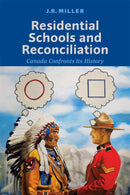Description
Residential Schools and Reconciliation sheds light on one of the darkest periods in Canadian history.
Since the 1980s, successive Canadian institutions and federal governments as well as Christian churches have attempted to grapple with the malignant legacy of residential schooling through official apologies, the Royal Commission on Aboriginal Peoples, the Indian Residential Schools Settlement Agreement, and the Truth and Reconciliation Commission (TRC).
In Residential Schools and Reconciliation, award-winning author J.R. Miller tackles and explains these institutional responses to Canada’s residential school legacy. Analysing archival material and interviews with former students, politicians, bureaucrats, church officials, and the Chief Commissioner of the TRC, Miller reveals a major obstacle to achieving reconciliation – the inability of Canadians at large to overcome their flawed, overly positive understanding of their country’s history. This unique, timely, and provocative work asks Canadians to accept that the root of the problem was Canadians like them in the past who acquiesced to aggressively assimilative policies.
Since the 1980s, successive Canadian institutions and federal governments as well as Christian churches have attempted to grapple with the malignant legacy of residential schooling through official apologies, the Royal Commission on Aboriginal Peoples, the Indian Residential Schools Settlement Agreement, and the Truth and Reconciliation Commission (TRC).
In Residential Schools and Reconciliation, award-winning author J.R. Miller tackles and explains these institutional responses to Canada’s residential school legacy. Analysing archival material and interviews with former students, politicians, bureaucrats, church officials, and the Chief Commissioner of the TRC, Miller reveals a major obstacle to achieving reconciliation – the inability of Canadians at large to overcome their flawed, overly positive understanding of their country’s history. This unique, timely, and provocative work asks Canadians to accept that the root of the problem was Canadians like them in the past who acquiesced to aggressively assimilative policies.


